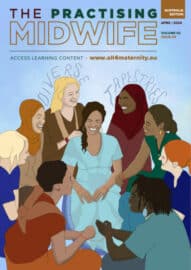Inequalities in Perinatal Mental Health Outcomes

Instagram:@Londonstudentmidwife
Summary
Inequalities in perinatal mental health outcomes have been an ongoing issue in UK maternity services, with marginalised women and birthing people including those from ethnically diverse groups, lower socio-economic backgrounds and the LGBTQIA+ community being worst affected. Yet despite ongoing research into the reasons behind these inequalities, they continue to be poorly understood by midwives and birth workers. In order to enable early intervention and promote positive outcomes, it is imperative that all birth workers are continuously educated about the signs and symptoms of perinatal mental health disorders across all birthing populations, irrespective of their ethnic origin, socio-economic status or sexual or gender identities. This could save many women and families from life changing trauma and in some cases, even save lives and optimise opportunities for better perinatal outcomes.
Introduction
The topic of disparities in perinatal mental health (PNMH) outcomes has been widely discussed for years, in fact, suicide is known to be one of the leading causes of maternal death during pregnancy and up to one year postpartum. Research has highlighted how PNMH disorders can have detrimental effects on women, babies and their wider families and that the women most prone to inequities in regard to PNMH are more likely to be from deprived areas and minority groups, which raises the following questions:
- Why do clients from marginalised groups appear to receive poorer care in relation to their perinatal mental health?
- Are all birth workers (midwives, maternity support workers, obstetricians and doulas) aware of the short-term and long-term impact perinatal mental ill health has on these groups?
Types of Perinatal Mental Illnesses 1
- Depression
- Anxiety
- Post-Traumatic Stress Disorder (PTSD)
- Obsessive Compulsive Disorder (OCD)
- Eating Disorders
- Postpartum Psychosis
The potential impact of perinatal mental illness 2
- Suicide or suicidal ideation
- Impaired mother-baby bonding
- Changes in physical well-being
- Impaired social engagement
- Self-harm
- Fear of subsequent pregnancy and childbirth
- Behavioural changes
- Negative effects on relationships
- Impaired short-term or long-term fetal/neonatal neurological development
- Future mental health disorders
Ethnic disparities
As the Mothers and Babies: Reducing Risk through Audits and Confidential Enquiries across the UK (MBRRACE) report3 has identified women from Black, Asian and mixed ethnicity backgrounds are more likely than their white counterparts to die in childbirth and the first year after giving birth. This has been attributed to systematic racism, institutionalised medical bias, racial stereotyping and healthcare professionals ignoring the concerns voiced by people of colour; which has led to this client group expressing distrust towards healthcare providers.4 Further research has also found that non-white ethnicity puts women at greater risk of being subjected to inequitable care in regards to their PNMH.6 This ingrained bias can result in women from Black, Asian and marginalised ethnic backgrounds not being listened to by maternity workers when asking for support.
The impact of low socioeconomic status
In the UK, Black, Asian and ethnic minority women are also more likely to have lower socioeconomic status,5 be from deprived areas and face barriers in regard to recognition, care and treatment for perinatal mental health disorders.6 Having a low socioeconomic status has been linked to poor mental health due to the stress caused by having a low income or relying on government benefits for financial stability.7 Worries about money and housing issues can be extremely taxing and such stress can be amplified by the arrival of a newborn, and cause or exacerbate previous mental-health issues such as depression or anxiety. It is not entirely clear why women from deprived areas have less support in regard to their PNMH, however, staff shortages, PNMH service suspension due to lack of funding or healthcare professionals’ lack of understanding about PNMH could be contributing factors. Women with lower socioeconomic status and PNMH disorders are also at increased risk of breastfeeding challenges, since 25% of people in highly-deprived areas are more likely to be prescribed psychotropic medications, which can potentially have adverse effects on breast-feeding, compared to those in less deprived areas.8
LGBTQIA+ communities
Birthing people from LGBTQIA+ communities may also face the same barriers as maternity service users that are non-white or come from low socio-economic backgrounds. However, there is evidence that they also have to deal with barriers that are associated with their sexual and gender identity. Minority stress, which is described as additional stressors that members of marginalised groups face due to prejudice and discrimination, causes increased poor health amongst members of the LGBTQIA+ community, as they experience fear that they will be stigmatised, marginalised and discriminated against by maternity care providers.9 All midwifery educators and hospital Trusts should be providing staff education about how to work in an inclusive manner, and asserting that the use of correct gender pronouns is a necessity. It is also important that any reading material or online literature recommended to service users is inclusive and portrays both heteronormative and non-heteronormative different family structures10.
The PNMH disorders that affect 1 in 5 women do not just impact these individuals in isolation, they also affect their children, family and friends.11 As such, urgent steps need to be taken to mitigate their impact. In light of the Government’s pledge to give NHS Maternity Services £96million, I feel that some of this funding needs to go towards educating all birth workers about the signs and symptoms of different PNMH disorders and their short and long-term effects. Funding is also needed to address the major staff shortages afflicting maternity services across the UK, as this would afford maternity staff more opportunities to recognise when women are struggling with their PNMH.
There are plans to increase the number of Mother and Baby Units (MBU) where women can access help for PNMH issues without being separated from their newborns. Funding needs to be continuously supplied to these MBUs to enable them to remain open and provide the care and support which clients need. Birth workers should always provide fair and equitable care and acknowledge that there are marginalised groups that are currently under-served. We must all work harder to make maternity care fair for all whilst being sensitive to individual needs; this means being aware of the different signs and symptoms of various PNMH disorders and thoroughly assessing each client’s mental-health status at every point of contact, rather than just asking the Whooley Questions as part of a tick-box exercise.
Finally, educating clients and their partners about the different symptoms of PNMH disorders empowers them to flag up any concerns early on, which will hopefully enable them to access help as soon as possible. In practise, this means making PNMH referrals promptly, rather than waiting until a woman is in crisis, involving women in the referral process and signposting them sources of support should they need it.
Recommended resources
- Royal College of Midwives. Specialist Mental Health Midwives, What they do and Why they matter. https://www.rcm.org.uk/media/2370/specialist-mental-health-midwives-what-they-do-and-why-they-matter.pdf
- Red Flags for GPs in Perinatal Mental Health https://www.rcgp.org.uk/clinical-and-research/resources/toolkits/~/media/8BB0A8DDBFF045BAB32F48B607773A69.ashx
- Top Tips for Effective Communication in Perinatal Mental Health https://www.rcgp.org.uk/clinical-and-research/resources/toolkits/~/media/179F47DFDF25475A9D88EE0A7C41D8F6.ashx
- Structural Racism and Health Inequities by Gilbert C Gee and Chandra L Floyd (2011) https://www.ncbi.nlm.nih.gov/pmc/articles/PMC4306458/
- A Brief History of Racism in Healthcare by Henry Kretchmer (2020) https://www.weforum.org/agenda/2020/07/medical-racism-history-covid-19/
Conclusion
Women and birthing people from Black, Asian and minority ethnic groups, low socio-economic backgrounds and LGBTQIA+ communities face a host of biases and barriers and sometimes even neglect when accessing healthcare. As healthcare professionals we must enforce change and make maternity care equitable and accessible for all. All healthcare professionals have a responsibility to their clients to provide individualised, judgement-free care at every point of contact whilst taking their concerns into consideration.
References
- Mind Org. Postnatal Depression and Perinatal Mental Health. 2020. Accessed October 31, 2021. https://www.mind.org.uk/information-support/types-of-mental-health-problems/postnatal-depression-and-perinatal-mental-health/about-maternal-mental-health-problems
- Stein A, Pearson RM, Goodman SH, Rapa E, Rahman A, McCallum M, Howard LM, Pariante CM. Effects of Perinatal Mental Health Disorders on the Foetus and Child. The Lancet. Accessed October 31, 2021. https://www.sciencedirect.com/science/article/abs/pii/S0140673614612770#cesec30
- Knight M, Bunch K, Tuffnell D, Shakespeare J, Kotnis R, Kenyon S, Kurinczuk JJ. MBRRACE Maternal Report 2020. Accessed June 9, 2021. https://www.npeu.ox.ac.uk/assets/downloads/mbrrace-uk/reports/maternal-report-2020/MBRRACE-UK_Maternal_Report_Dec_2020_v10_ONLINE_VERSION_1404.pdf
- Horn A. Racism Matters: When people show you who they are, believe them: Why Black Women Mistrust Maternity Services. 2020. The Practicing Midwife Journal. Accessed October 31, 2021. https://www.all4maternity.com/racism-matters-when-people-show-you-who-they-are-believe-them-why-black-women-mistrust-maternity-services/
- Francis-Devine B. Which ethnic groups are most affected by income equality. House of Commons Library. Accessed October 31, 2021. https://commonslibrary.parliament.uk/income-inequality-by-ethnic-group/
- Kozhimannil KB, Trinacty CM, Busch AB, Huskamp HA, Adams AS. ‘Racial and ethnic disparities in postpartum depression care among low-income women’. 2011. Psychiatry Online. Accessed October 31, 2021. https://ps.psychiatryonline.org/doi/10.1176/ps.62.6.pss6206_0619?url_ver=Z39.88-2003&rfr_id=ori:rid:crossref.org&rfr_dat=cr_pub%3dpubmed
- Mental Health Foundation. Mental Health Statistics: Poverty. Accessed October 31, 2021. https://www.mentalhealth.org.uk/statistics/mental-health-statistics-poverty
- Hodgeson K, Stafford M, Fisher R, Docherty M, Deeny S. Inequalities in Healthcare for people with Anxiety and/or Depression. 2020. The Health Foundation. Accessed October 31, 2021. https://www.health.org.uk/publications/long-reads/inequalities-in-health-care-for-people-with-depression-and-anxiety
- Warwick-Guasp L. LGBTQ+ parent families and perinatal mental health. 2021. Accessed June 9, 2021 https://ihv.org.uk/news-and-views/voices/lgbtq-parent-families-and-perinatal-mental-health/
- Lai-Boyd B. Maternity Care for LGBTQ+ People – how can we do better? 2020. The Practicing Midwife Journal. Accessed October 31, 2021. https://www.all4maternity.com/maternity-care-for-lgbtq-people-how-can-we-do-better/
- Maternal Mental Health: Women’s Voices. 2017. Accessed July 6, 2021. https://www.rcog.org.uk/globalassets/documents/patients/information/maternalmental-healthwomens-voices.pdf












